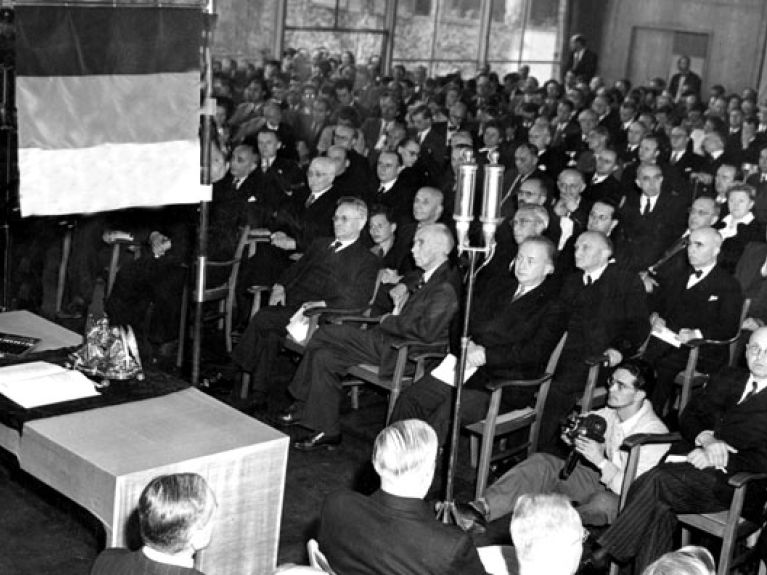65th Anniversary of the Federal Republic of Germany
23 May 1949 marked the birth of the Federal Republic of Germany.

When the Basic Law was proclaimed on 23 May 1949, and came into effect on the following day, it laid the foundation stone to the parliamentary democracy of the Federal Republic of Germany. The colours chosen for the federal flag were black, red and gold, the colours that had symbolised the democratic tradition since the Vormärz period of German history in the mid-19th century. This opened the way for the first parliamentary elections for the Bundestag on 14 August 1949. In the west of post-war Germany, there had already been elections for the parliaments of the federal states, and local government elections in the cities and communities. Now it was time for the voters to take part in the nationwide election of a new parliament with 420 members, including ten members from West Berlin. The turnout was very high with 78.5 per cent of the electorate casting their votes. This was also regarded as a vote of approval by the people themselves for the Basic Law, which until then had only been passed by the parliaments of the federal states.
Konrad Adenauer becomes the first Federal Chancellor
The conservative CDU/CSU parliamentary group was the strongest in the Bundestag after receiving 31 per cent of the votes, and the former mayor of Cologne, Konrad Adenauer, was elected as the first Federal Chancellor. He had previously been the President of the Parliamentary Council whose members had created the Basic Law and thus the foundations of this new state. The Social Democrat, Kurt Schumacher, became chairman of the SPD parliamentary group and led the strongest opposition in parliament. The SPD had received 29.2 per cent of the votes.
During the first years, the Bundestag passed many laws that were to determine the inner organisation and the continuing political path of the young Federal Republic. Chancellor Adenauer, who was to rule the country until 1963, pursued a clear western course, but firmly maintained the goal of German reunification at the same time. In the Soviet occupied zone, Moscow had pushed for the founding of the German Democratic Republic (GDR). On 7 October 1949 the division of Germany was sealed when, in East Berlin, the co-founder of the Socialist Unity Party (SED) Wilhelm Pieck proclaimed the GDR as the new state. For decades, this shifted the possibility of a reunified post-war Germany into the distant future.
Proclamation of the Basic Law on 23 May 1949
